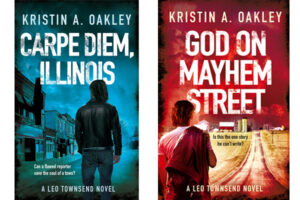Please note: This article was originally published on the Chicago Writers Association’s blog.
You’ve just returned home from a writer’s conference and your head is spinning from all that you’ve learned. You had a wonderful time socializing with other writers—your people—and have made valuable connections. You’re incredibly inspired. Now what?
Here are 10 tips to apply what you’ve learned:
- Review your notes and handouts from the conference, implement the advice, and create your own how-to write guide. I have binders labeled “Character,” “Plot,” “Scenes/Setting,” “Editing,” “Marketing,” and more. I’ve filled the binders with handouts from conferences and refer to them often.
- Consider what advice resonated with you and follow it. Was it a great tip on fighting writer’s block? A writing exercise to help you understand your protagonist’s motivations? Information about hiring an editor? Effective ways to gain publicity for your latest release? Whatever inspired you give it a try.
- Share what you’ve learned with writers who couldn’t attend and teach them what you’ve learned. You’ll remember the material so much more if you do. This is particularly true when you learn something about the craft of writing but can also work well for marketing information. Your colleagues will thank you for it!
- Networking is essential for writers, so keep in touch with writers you’ve met at conferences. Drop them an email telling them how wonderful it was to meet them and ask them how their latest project is going. Even better, get together for coffee and quality writing time. Also, contact the presenters (if they’ve given out their contact information) and be sure to thank them for their workshops. Be specific on what you gleamed from their words. Finally, be sure to thank the conference organizers for their hard work and give them valuable feedback in anticipation of next year’s conference.
- Start a regular writing habit. Stephen King writes 1,000 words a day, every single day—even on his birthday and Christmas. That’s a tall order, but writing every day, even just a few words, is good practice. It gets you focused on your project and keeps you thinking about it, so when you get back to it, the writing becomes easier.
-
- But don’t beat yourself up if you can’t write every day. Make a commitment to write when you can and then stick to it. Be realistic. It’s easier to commit to ten minutes a day than it is to two hours. However long you decide your writing sessions will be, set your timer and write until the alarm goes off. Oftentimes you’ll keep writing even after the bell sounds.
-
- If you get stuck, look back through your conference notes for exercises and words of wisdom to inspire you. I also recommend books which have writing exercises like The 90-Day Novel by Alan Watt.
- Establish effective goals to complete your work-in-progress:
-
- Pick a time of day to write and stick with it. You might get up early before going to work, write on your lunch hour, or wait until after everyone else is in bed at night. After a few months, assess whether this time works for you and change it if necessary.
- Pick a location that works best. Coffee shop? Home office? Library? If you work at home, be sure other family members understand you’re working so there are no interruptions.
- Set goals – they help you get the work done and reduce the chance of procrastinating. These include:
-
-
- Daily goals such as setting a word count, page count, or the number of hours you’ll write.
- Weekly goals – for example finish a chapter, complete research on a particular issue, or edit fifty pages.
- Monthly goals – three chapters or thirty pages in a month or a rough draft in 3-6 months.
- Yearly goals — a book a year.
- External goals — based upon upcoming events like pitching to an agent at a conference, sending the next chapter to a critique group, or submitting a poem or short story to a contest or journal before their deadline.
-
- Join or form a critique group:
- Joining a critique group:
- Select a group of people who are at or slightly above your writing level and who are working on similar projects: poems, short stories, nonfiction books, or novels/memoirs.
- Make sure the members are committed to attending meetings. Continuity is key, especially if you’re writing a large project such as a novel or a memoir.
- You know the group is a good fit for you when you feel energized and eager to write after a meeting. If you don’t feel inspired, then find another group.
- Joining a critique group:
-
- Forming a critique group:
- Start with people you’ve connected with at writer’s conferences. You can also advertise at your local library and check in with writer’s organizations.
- Decide on the day, time, and place or whether the group will be virtual.
- Commit to both submitting and critiquing. Critiquing takes time but is worth it; you’ll learn a lot about your own writing when you critique others.
- Be flexible with the group’s format. If meeting once a month isn’t enough, then change the schedule. If a member isn’t a good listener, then require each person being critiqued to save their comments until after everyone has spoken (be sure to take notes).
- Forming a critique group:
- Submit your work to journals and contests. It’s great for establishing deadlines and, if your piece is accepted, stroking your ego. Even if your piece is rejected, many publications will give you valuable feedback. Before submitting read editions of the journals and their submission guidelines.
- Submit to the Chicago Writers Association’s The Write City Magazine — they pay upon publication! $50/CWA members, $25/nonmembers for prose and $35/CWA members, $10/nonmembers for poems.
- To find other journals:
-
- Sign up for Duotrope – a one-week trial is free or $5/month or $50/year.
- Look to Poets & Writers online for their list of literary magazines.
-
- For writing contests check Poets & Writers for a comprehensive list.
- Don’t forget to read! Just like with your writing, establish a regular reading habit. If you’re looking for a good book, pick one of the suggestions mentioned at a conference or buy one of the presenters’ books. Be sure to read outside your genre. My suggestions: On Writing by Stephen King, Writing the Breakout Novel by Donald Maass, Station Eleven by Emily St. John Mandel, Valentine by Elizabeth Wetmore, Project Hail Mary by Andy Weir, and Red Rising by Pierce Brown.
And finally,
- Look ahead to future conferences. Research their offerings and presenters, select the conference or conferences best suited for you, and then look forward to your next bout of inspiration!



